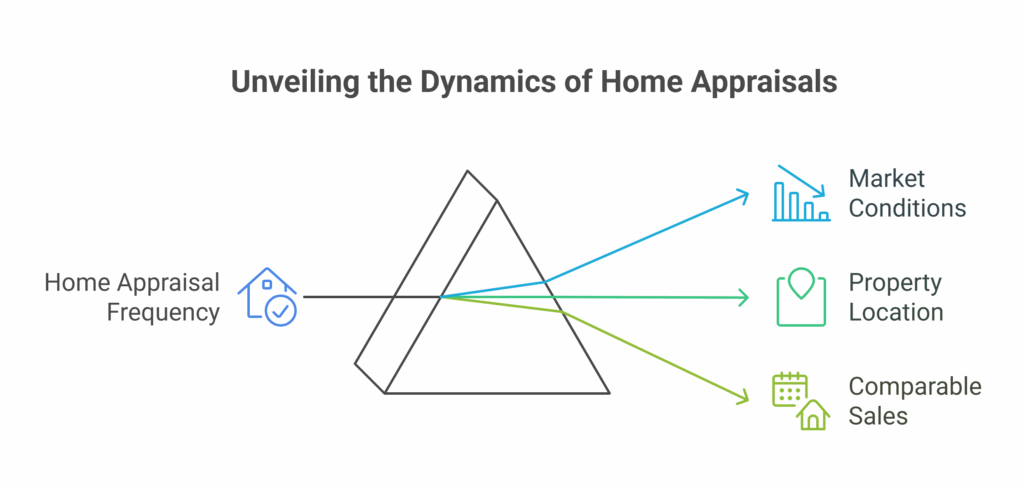Quick Answer: How Often Do Homes Appraise for Less?
Homes don’t always appraise for the price buyers and sellers expect—sometimes they come in lower. This can happen for a variety of reasons, like market fluctuations, comparable sales in the area, or the property’s condition. In fact, it’s not unusual for homes to appraise for less, especially in fast-moving markets where offers climb higher than appraised values. When this happens, buyers might need to renegotiate, bring in extra cash, or dispute the appraisal.
For anyone wondering “How Does Homes.com Work?”—it’s a platform that helps users explore property values, compare neighborhoods, and understand market conditions. While it can’t guarantee your home’s appraisal value, it does provide tools to help set realistic expectations before the appraiser steps in.
Now let’s dive deeper.

Understanding Home Appraisals
A home appraisal is a professional estimate of a property’s market value, conducted by a licensed appraiser. Lenders use this estimate to ensure they’re not lending more money than a property is worth. When a home appraises for less than the agreed purchase price, the lender will typically only finance up to the appraised amount. This can throw a wrench into the transaction, leaving both buyers and sellers scrambling to renegotiate.
How Common Are Low Appraisals?
Low appraisals are not an everyday occurrence, but they happen more often than many people realize—especially in hot real estate markets. According to Fannie Mae data and various industry reports, about 7% to 15% of real estate transactions result in an appraisal below the contract price.
Here are some scenarios where low appraisals are more likely to occur:
- Rapidly appreciating markets – When home prices rise quickly, recent comparable sales may not reflect the current market.
- Overbidding – In competitive markets, buyers may offer more than a home is worth, leading to appraisal shortfalls.
- Unique or uncommon properties – Homes with rare features or in unusual locations may be harder to appraise accurately.
- Poor appraisal practices – If an appraiser is unfamiliar with the local market or uses outdated comps, the value could be skewed.
Why Do Homes Appraise for Less?
There are several reasons why an appraisal might come in low:
1. Overpriced Listings
Sometimes, sellers overprice their homes due to emotional attachment, outdated information, or unrealistic expectations. If the offer is based on this inflated price, the appraisal could reflect a more realistic market value.
2. Limited Comparable Sales
Appraisers rely on recent sales of similar homes (called “comps”) within the same area. If there aren’t enough comps, or if the comps are not truly comparable, it can result in an inaccurate valuation.
3. Market Volatility
Markets can change quickly. If prices have recently risen or fallen sharply, an appraiser using older data might not capture the current market conditions.
4. Property Condition
An appraiser evaluates not just size and location, but also the home’s condition. Deferred maintenance, outdated features, or undisclosed issues can all lower the appraised value.
What Happens if a Home Appraises for Less?
When the appraisal comes in lower than the purchase price, it can create several outcomes:
- Renegotiation: Buyers may ask the seller to lower the price to match the appraisal. Sellers might agree if they don’t want the deal to fall through.
- Increased Down Payment: Buyers can choose to cover the difference out of pocket, though this can strain finances—especially for first-time homebuyers.
- Dispute the Appraisal: Either party may contest the appraisal by providing additional comps or requesting a second opinion.
- Cancel the Contract: If the deal includes an appraisal contingency, the buyer can walk away without penalty if the home appraises low.
How Sellers Can Avoid a Low Appraisal?
While sellers can’t control the appraiser’s opinion, they can take steps to help the process:
- Price your home realistically based on recent sales in your area.
- Provide a list of upgrades and improvements to highlight added value.
- Prepare your home for the appraiser just like you would for a showing—clean, declutter, and repair anything obvious.
- Have your agent attend the appraisal to offer context and comps if needed.
How Buyers Can Protect Themselves?
Buyers can also take precautionary measures:
- Include an appraisal contingency in the purchase agreement to give yourself an out if the appraisal comes in low.
- Work with a local real estate agent who understands the market and can recommend reasonable offers.
- Avoid emotional overbidding just to win a bidding war.
When Low Appraisals Become a Pattern?
If low appraisals are happening frequently in a given area, it may point to a deeper issue in the market. In some cases, appraisers may be under pressure from lending institutions to remain conservative, especially in uncertain economic conditions.
On the flip side, a steady pattern of low appraisals can lead to reduced asking prices over time, slowly correcting inflated markets. Understanding these trends is important for both buyers and sellers to make informed decisions.
The Role of Cash Buyers
One effective way to avoid the complications of a low appraisal is to work with cash buyers. Since no lender is involved, there’s no need for a formal appraisal unless requested by the buyer. Cash transactions close faster, face fewer delays, and eliminate the risk of appraisal-related issues.
If you’re trying to sell a home and are concerned about the appraisal process or want to skip the stress of traditional financing altogether, working with cash buyers in Texas might be the perfect solution.
Looking to sell your home quickly and without complications? Connect with trusted cash buyers in Texas today. Visit our website now to learn more and get started with a free, no-obligation offer.
Call us anytime at 713-561-5162 or connect with us on our website and we’ll lay out all of your options for your specific situation.
